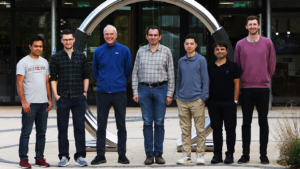Five minutes with Tim Weil, CEO of Lumai
Lumai’s CEO was recently featured in an article by Oxford Trust. Read the article below and here.
Incredible technological developments in computing have given us a virtual world that we can navigate as quickly as our fingertips (and brain) can keep up. Yet today’s computing performance isn’t nearly quick, smart or energy efficient enough for the demands of super-computing, big data, and the future of artificial intelligence (AI).
This is where Wood Centre for Innovation-based start-up Lumai, and their quest into deep optics, comes in. Lumai, formerly known as OxONN, is on a mission to make computing faster, smarter and more sustainable, and by doing so, unlock the potential of the next generation of AI. We spoke to Tim Weil to find out how the Lumai team is developing world firsts in optical computing and neural networks, and how this will revolutionise efficiency in multiple industries.
The Lumai team
Lumai, a spinout from the University of Oxford, boasts an impressive founding team of four leading knowledge producers and pioneers in optical computing and machine learning. Prof. Alex Lvovsky from the Department of Physics at the University of Oxford is world renowned in the fields of quantum optical technology, AI and robotics. Dr Thomas Barrett is a machine learning researcher and expert. Dr Xianxin Guo is the primary inventor of Lumai’s optical training technology and James Spall is a co-developer of Lumai’s core technology in optical computing. This founding team came together through their shared fascination for AI, and a goal to transform AI with their expertise in optical computing.
The company now has four full time optical engineers, who are focused on technical development. Tim joined as CEO in February 2022 to lead the company through commercial outreach, fundraising and more. He brings 25 years of experience of launching, developing and growing a variety of deeptech companies.

Changing AI
So what makes Lumai’s technology a game-changer for AI? They are developing a new physical method for ‘training’ and ‘learning’ in AI. AI requires high-speed computing, with near zero latency (or delay). The ‘training’ and ‘learning’ in AI, particularly, takes a long time and a lot of energy. At large scale and increasing complexities, traditional electronic neural networks and computing cannot meet the demands. Optical neural networks, which use photons (light) instead of electrons to transfer information and perform calculations, are faster and require less energy.
However, it hasn’t been that simple. Learning, through a celebrated algorithm called backpropagation, in optical neural networks has been challenging. But the team at Lumai has developed and patented a method of optical backpropagation to make learning through optical computing possible, removing the need for digital training of optical networks. This makes the crucial aspect of training in AI much quicker and less energy demanding.
By addressing this part of the puzzle, Lumai is producing the world’s first end-to-end optically-trained neural network, with optical computing integrated across the AI system. With this, they are unlocking the potential for computing and machine learning at faster speeds, with near zero latency (delays), and at greater scales than ever before, all the while consuming far less energy than traditional electronics.
Big benefits
This is good news for many sectors. Autonomous driving requires instant calculations in an ever-changing environment. Robotics requires high-speed processing and sensitive sensors. Advances in methods of drug discovery are drawing on complex AI. Cyber security requires quick responses to evolving threats. Large data centres that support businesses, internet services and our social media, and which are estimated currently to consume about 1% of all global electricity, need to lower their energy requirements and costs. With such broad impact, Lumai potentially has a global customer base.
Creating the product
Since moving into the Wood Centre earlier this year, the team at Lumai have been refining their technology, enabled through initial funding from IP Group plc, their primary investor, and Runa Capital, their secondary investor. Over the next 18 months, they will be working to turn their technology into product, creating a usable set of computing components and hardware for data centres and the AI industry. To facilitate Lumai’s further growth, they aim to open up to a series A funding round toward the end of the first quarter of next year.
At this phase of their start-up journey, the Wood Centre for Innovation provides an ideal space. Tim says “In some ways, the Wood Centre ticks all the boxes as it has the lab space and office space, and is a nice working environment.”
It is great to have you in our centre. We look forward to seeing the development and successes to come.